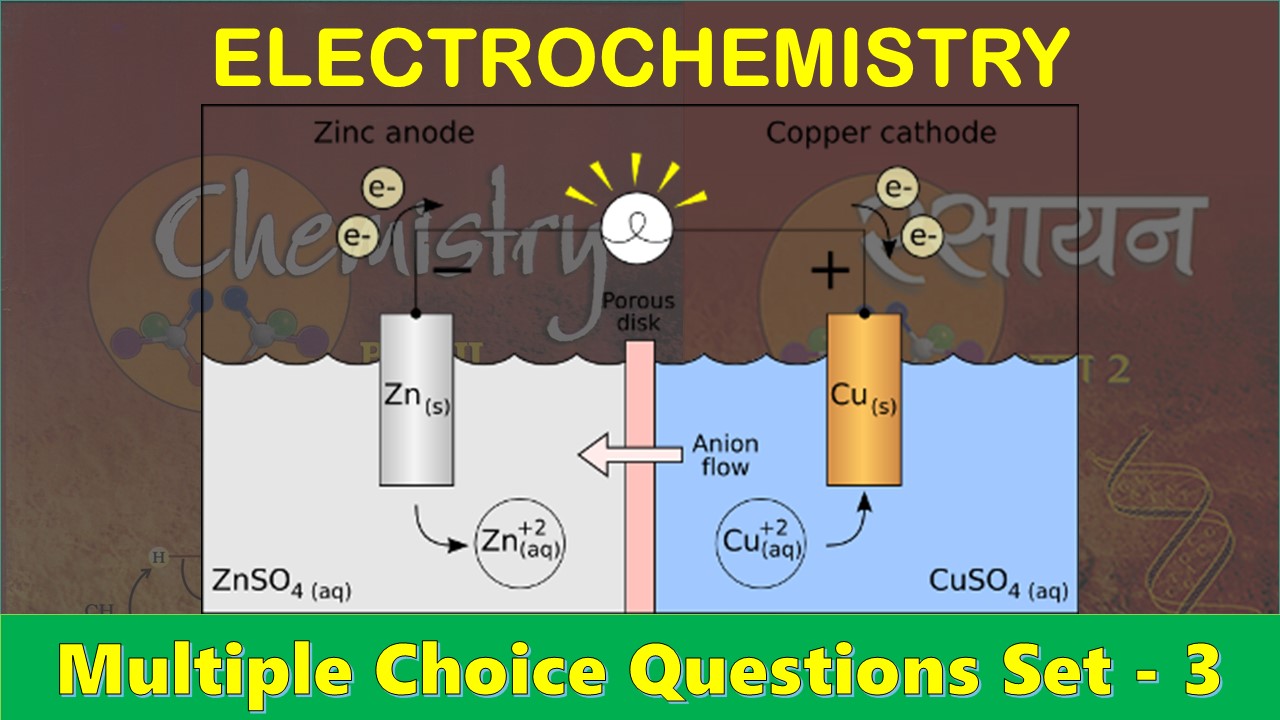CBSE Class 12 Electrochemistry Multiple Choice Questions with Answers. MCQ Questions Class 12 Electrochemistry with Answers Is Prepared Based on Latest Exam Pattern. Students can solve NCERT Class 12 Electrochemistry MCQs with Answers to know their preparation level.
Students who are searching for NCERT MCQ Questions for Class 12 Electrochemistry with Answers are compiled here to get good practice on all fundamentals. Know your preparation level on MCQ Questions for Class 12 Electrochemistry with Answers. You can also verify your answers from our provided MCQ Class 12 Electrochemistry with Answers. So, ace up your preparation with MCQ of Class 12 Chemistry Examinations.
MCQ Questions Class 12 Electrochemistry with Answers - Set - 3
Question 1:
Molar conductivity of 0.15 M solution of KCl at 298 K, if its conductivity of 0.0152 S cm-1 w ill be
(a) 124 Ω-1 cm² mol-1
(b) 204 Ω-1 cm² mol-1
(c) 101 Ω-1 cm² mol-1
(d) 300 Ω-1 cm² mol-1
Correct Answer – (C)
Question 2 :
Which of the following is a secondary cell?
(a) Leclanche cell
(b) Lead storage battery
(c) Concentration cell
(d) All of these
Correct Answer – (B)
Question 3 :
Fused NaCl on electrolysis gives ………….. on cathode.
(a) Chlroine
(b) Sodium
(c) Sodium amalgam
(d) Hydrogen
Correct Answer – (B)
Question 4 :
The highest electrical conductivity of the following aqueous solutions is of?
(a) 0.1 M acetic acid
(b) 0.1 M chloro acetic acid
(c) 0.1 M fluoroacetic acid
(d) 0.1 M difluoro acetic acid
Correct Answer – (D)
Question 5 :
The half-cell reactions for rusting of iron are
2H+ +½O2 + 2e¯ ? H2O, E° = + 1.23 V
Fe2+ + 2e¯ ? Fe (s), E° = – 0.44 V? G° (in kj) for the reaction is
(a) -76
(b) -322
(c) -122
(d) -176
Correct Answer – (A)
MCQ Questions Class 12 Electrochemistry with Answers
Question 6:
For a certain redox reaction, E° is positive. This means that
(a) ΔG° is positive, K is greater than 1
(b) ΔG° is positive, K is less than 1
(c) ΔG° is negative, K is greater than 1
(d) ΔG° is negative, K is less than 1
Correct Answer – (C)
Question 7:
The standard electrode potentials for the half cell reactions are:
Zn → Zn2-– 2e– E° = 0.76 V
Fe → Fe2- + 2– E° = -0.41 V
The emf of the cell reaction
Fe2- + Zn → Zn2- + Fe is
(a) -0.35 V
(b) +0.35 V
(c) -1.17 V
(d) +1.17 V
Correct Answer – (B)
Question 8:
If 96500 coulomb electricity is passed through CuSO4 solution, it will liberate
(a) 63.5 gm of Cu
(b) 31.76 gm of Cu
(c) 96500 gm of Cu
(d) 100 gm of Cu
Correct Answer – (B)
Question 9:
An aqueous solution containing one mole per litre of each of Cu(NO3)2, AgNO3, Hg (NO3)2 and Mg (NO3)2 is being electrolysed using inert electrodes. The values of standard electrode (reduction) potentials in volts are Ag/Ag+ = + 0.80, Hg/ Hg2+ = 0.79, Cu/Cu2+ = 0.34, Mg/Mg2+ = -2.37.
With increasing voltage, the sequence of deposition of metals on cathode will be
(a) Ag, Hg, Cu, Mg
(b) Mg, Cu, Hg, Ag
(c) Ag, Hg, Cu
(d) Cu, Hg, Ag
(e) Cu, Hg, Ag, Mg.
Correct Answer – (C)
Question 10:
If the equivalent conductance of 1 M benzoic acid is 12.8 ohm-1 cm² and if the conductance of benzoate ion and H+ ion are 42 and 288.42 ohm-1 cm² respectively, its degree of dissociation is:
(a) 39%
(b) 3.9%
(c) 0.35%
(d) 0.039%
Correct Answer – (B)
- NCERT Solutions Class 11 Chemistry Chapter 1 : Some Basic Concepts of Chemistry
- NCERT Solutions Class 11 Chemistry Chapter 2 : Structure Of The Atom
- NCERT Solutions Class 11 Chemistry Chapter 3 : Classification of Elements and Periodicity in Properties
- NCERT Solutions Class 11 Chemistry Chapter 4 : Chemical Bonding and Molecular Structure
- NCERT Solutions Class 11 Chemistry Chapter 5 : States of Matter
- NCERT Solutions Class 11 Chemistry Chapter 6 : Thermodynamics
- NCERT Solutions Class 11 Chemistry Chapter 7 : Equilibrium
- NCERT Solutions Class 11 Chemistry Chapter 8 : Redox Reactions
- NCERT Solutions Class 11 Chemistry Chapter 9 : Hydrogen
- NCERT Solutions Class 11 Chemistry Chapter 10 : The s-Block Elements
- NCERT Solutions Class 11 Chemistry Chapter 11 : The p-Block Elements
- NCERT Solutions Class 11 Chemistry Chapter 12 : Organic Chemistry: Some Basic Principles and Techniques
- NCERT Solutions Class 11 Chemistry Chapter 13 : Hydrocarbons
- NCERT Solutions Class 11 Chemistry Chapter 14 : Environmental Chemistry




